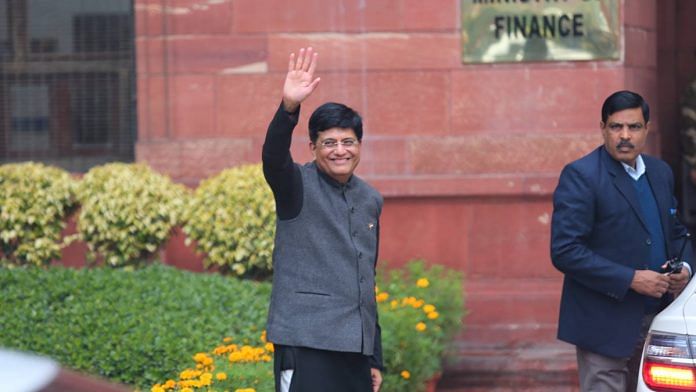New Delhi: Minister of Commerce and Industry Piyush Goyal’s decision to skip a crucial ministerial meeting on the proposed Regional Comprehensive Economic Partnership (RCEP) this week may delay the pact talks further even as the perceived ‘China threat’ continues to loom large over the Indian industry.
According to an official in the Union Ministry for Commerce and Industry, Goyal won’t be attending the upcoming round of the trade ministers’ meet due to an extension of the Parliament session until 7 August. The RCEP meet is set to take place on 2-3 August to conclude the negotiations.
Commerce Secretary Anup Wadhawan will be attending the meet on Goyal’s behalf, said the official who didn’t wish to be named.
The RCEP is a proposed mega free trade agreement (FTA) that is presently being negotiated between the 10 ASEAN (Association of Southeast Asian Nations) members and their six trading partners — India, China, Australia, New Zealand, Japan and South Korea. The talks for RCEP were launched in 2012.
The last round of talks was held in Melbourne, Australia, on 3 July even as members decided to intensify the talks in order to conclude the pact by December.
Goyal’s last-minute cancellation is “more than what meets the eye” because this comes at a time when the Indian industry is vehemently opposed to the trade pact over issues related to lowering of tariffs and greater market access, sources told ThePrint.
The minister had been holding marathon meetings with all stakeholders, industry representatives and business chambers to understand implications of the proposed FTA if and when it concludes.
RCEP non-negotiable in present form
An official who is involved in the talks told ThePrint, “Almost 99.9 per cent of the industry meetings he (Goyal) held came to the conclusion that India should not negotiate RCEP in its present form. This is because in the present play of talks India is having to offer more in terms of industrial goods while gaining little on services by way of easier visa.”
In this round of the RCEP talks, India is supposed to make its proposal on tariff concessions for all the member countries, including China.
RCEP members, particularly China, have demanded zero tariffs over 90 per cent tariff lines which has become a huge cause of concern for India, the official added.
According to the official, countries such as Thailand, Indonesia and the Philippines have not been forthcoming in offering visa concessions to India. Under RCEP, any concession given to one member has to be given to all.
“The issue is India is not being able to articulate offensive interests and that is the main reason why we continue to lose out in these FTAs. We have to look for export opportunities and that is where Indian industry has failed the Indian government,” said the official.
“Indian industry continues to seek protection. Every country today is fighting China, not just India, yet we are scared of moving ahead,” added the official.
Also read: Piyush Goyal sparks Twitter storm after 2016 video of him reciting Kalma surfaces
‘China threat’
The official said while the industry is opposed to the state of negotiations in RCEP, the fact that has become most discomforting for the industry is giving more market access to Chinese goods.
Presently, India has a trade deficit of about $63 billion with China. As a result, the Indian industry is of the view that any further tariff concessions to China will spiral the trade gap out of control.
The issue is expected to be discussed during Foreign Minister S. Jaishankar’s visit to Beijing in the coming weeks. The visit is expected to be followed up with an informal meeting between Chinese President Xi Jinping and Prime Minister Narendra Modi in India.
Setback to ‘Act East Policy’
During a high-level meeting between Prime Minister Narendra Modi and Japanese Prime Minister Shinzo Abe at the G-20 Summit in Osaka in June, Tokyo had assured New Delhi that “all of the concerns of Indian industry will be taken care once India is on board (RCEP)”, according to a diplomat whose country is a member of the RCEP.
ASEAN, Japan and South Korea — all remain crucial for the success of India’s ‘Act East Policy’. It was Japan that had invited India to join the RCEP seven years back.
Any setback to the talks is bound to jeopardise India’s foreign policy initiative as far as ‘Act East’ is concerned, sources said.
The RCEP, once implemented, will become the world’s largest trading bloc, accounting for 40 per cent of the global GDP encompassing 50 per cent of the world’s population. It was conceived by ASEAN and China as an answer to the now-shelved Trans-Pacific Partnership (TPP) led by the US.
Also read: Why soldier-diplomats are key to maintaining peace along India-China border




Genuine fears of Indian industry – which date back to the Bombay Club – could be addressed / redressed. With China enjoying such an immense trade surplus – over $ 50 billion – unclear how much harm RCEP could cause. At the heart of RCEP lies ASEAN, the natural next frontier for a India, especially since SAARC is almost defunct. At the other end are the East Asian success stories like Japan and China. There is impatience, talk that India – which has held up things for so long – could join later. We have excluded ourselves from global manufacturing chains. Our exports are stagnant. The annual trade deficit remains stubbornly in the range of $ 150 – 200 billion, reflecting lack of global competitiveness. India’s long term economic, as well as diplomatic, interests lie in joining RCEP. India could negotiate some concessions on services, seek some steps / instalments for opening up specific sectors to imports. We should not turn our back to the most dynamic economic region in the world.